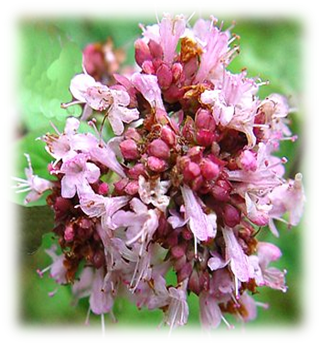


Oregano - origanum vulgare (Labiatae - Lamiaceae, Mint family) Characteristics and uses: Sometimes called the "prince of herbs" it is also called wild marjoram, and in some countries they are synonymous, but it has a stronger, more intense flavour than marjoram . It is native to warm-temperate Mediterranean and Eurasia and grows in full sun. It is a perennial herbs (at least in our warm climate), with white, pink or purple flowers produced in erect spikes. Oregano is an important aromatic culinary herb, used for its flavour, which can be more intense when dried than fresh. Grown in hot climates, it may be really strong, depending on the aromatic volatile or "essential content oils". It is used for seasoning soups, sauce, dressings, stews, but it is universally known as "the pizza herb", especially in Italian cuisine, where it is most frequently used with roasted, fried or grilled vegetables, meat and fish. It is the heart and soul of Mediterranean cuisine. This herb contains carbohydrate, protein, fat, sugar, fiber, water, but it is precious because of minerals (sodium, potassium, calcium, phosphorus, magnesium, iron and zinc) and vitamins (A and B group, as well as C, D, E and K). Aside from oregano's inherent nutritional value, it may impact overall nutrition by stimulating appetite. Oregano is the largest selling culinary herb; increases in consumption in recent years may be due to popularity of low-fat, low-salt diets. It is ideal for drying because it retains its flavour better than many other dried herbs: it smells heavenly and makes you want to cook.
Etymology: Oregano is the anglicised form of the Italian "origano" (from the latin term "origanum"). Probably deriving from the greek "oros" (mountain) and "gamos" (brightness, delight in). Other uses: In Austrian folk medicine, oregano was used internally (as tea) or externally (as ointment) for treatment of disorders of the gastrointestinal tract, respiratory tract, and nervous system. It is used in aromatherapy and perfumery. History and folklore: Origanum species have been cultivated in Egypt for over 3000 years and were used by the ancient Greeks. Oregano was believed, being carried, to protect against evil. In magical folklore, it could be burned to manifest spirits: it was thought to help the dead sleep peacefully. The use of Origanum for healing dates back centuries and is recorded in the earliest herbals and natural histories. Early writers like Theophrastus, Mithradates, Pliny, Dioscorides and Galen mentioned it. In the language of flowers it means "birth" and "joy", giving relief, comfort and health, peace and happiness. It could symbolize also innocence, consolation, kindness, courtesy. **** Erbe Matte cannot take any responsibility for any adverse effects from the use of plants. Always seek advice from a professional before using a plant medicinally.**** **** We carefully dry oregano stems when they are crisp, at the first bloom; after they are dried out, we remove the leaves and flowers by sliding our fingers down each stem. **** |

